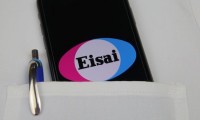-
Merck’s Keytruda Poised for Bladder Cancer Expansion with New Phase III Data
- Source: drugdu
- 105
- October 9, 2023
-
Merck’s Keytruda Poised for Bladder Cancer Expansion with New Phase III Data
- Source: drugdu
- 104
- October 8, 2023
-
New Alzheimer’s disease medication approved in Japan
- Source: drugdu
- 109
- October 6, 2023
-
FDA Authorizes Novavax’s Covid-19 Vax, Set to Join Fall Rollout of Updated Shots
- Source: drugdu
- 130
- October 4, 2023
-
Seagen and Astellas’ Padcev, in Keytruda combo, delivers ‘practice-changing’ bladder cancer win
- Source: drugdu
- 110
- October 4, 2023
-
Roche scores—again—in hemophilia drug patent case against Takeda
- Source: drugdu
- 188
- October 1, 2023
-
Novartis’ Lutathera Clears Phase III as Frontline Treatment for Rare Neuroendocrine Cancer
- Source: drugdu
- 137
- September 28, 2023
-
Morphic’s Ulcerative Colitis Pill Misses Expectations in Mid-Stage Study, Stock Falls
- Source: drugdu
- 164
- September 27, 2023
-
Novartis Returns Cancer Asset Tislelizumab to BeiGene
- Source: drugdu
- 117
- September 21, 2023
-
Anthos Stops Mid-Stage Atrial Fibrillation Trial Due to ‘Unprecedented’ Efficacy
- Source: drugdu
- 98
- September 20, 2023
your submission has already been received.
OK
Subscribe
Please enter a valid Email address!
Submit
The most relevant industry news & insight will be sent to you every two weeks.













